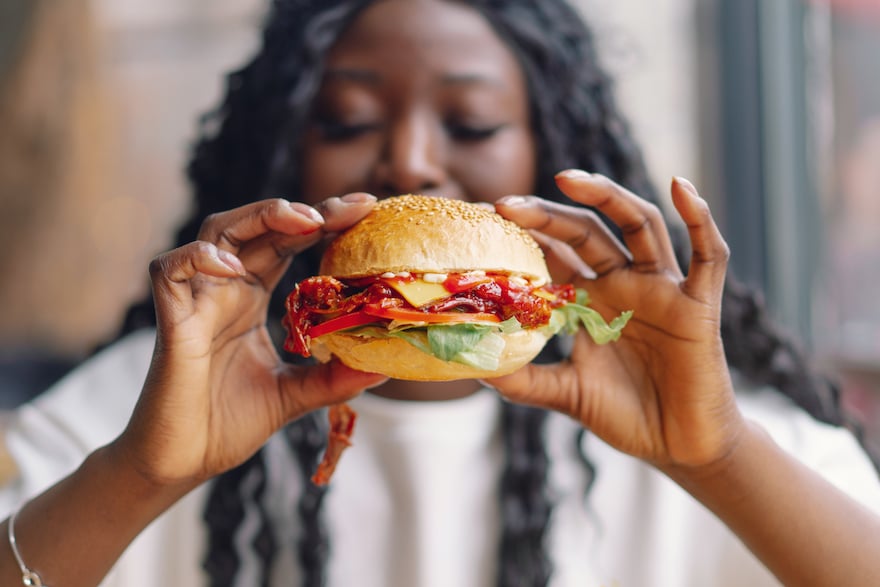If you’ve ever gone too long without eating, you’ve likely experienced hanger. Hanger is a form of anger brought on by hunger. But is it a real thing? We spoke to experts to find out why we get hangry and how to prevent it from happening.
You’ve seen the commercials before: Someone transforms into a negative, needy companion, their friend hands them a snack, and they revert back to their happy, original selves. It’s a phenomenon known as feeling “hangry,” or a certain type of anger and irritation that arises when you feel hungry. In recent years, the emotion of hanger (and its accompanying negative behaviors) has been researched.
At first, the results seemed straightforward. A 2016 study at the University of Gothenburg in Sweden found that ghrelin, the “hunger hormone,” increases impulsive behavior. Translation? Hungry people do dumb things. Another study at the University of Florida found that low glucose levels correlate with greater aggression in married couples. Their reasoning? Keeping the peace in a relationship requires self-restraint, which requires energy.
But while there is some truth to both of these theories, they may not paint the full picture.
So what exactly is hanger? And how do we stop it from taking control over our mid-afternoons or late nights? We spoke to experts to learn more about why we get hangry and how to keep hanger at bay.
What Does Hangry Mean?
You’ve likely felt hangry before, but what exactly is it? “‘Hangry’ is a portmanteau of hungry and angry,” says Jennifer MacCormack, PhD, assistant professor in the Department of Psychology at the University of Virginia who has studied hanger. “Studies suggest that when we’re hungry, we may be prone to feeling more negative and reactive—which includes emotions like anger, frustration, and irritability but can also include feeling more stressed, upset, anxious, or tense.”
Is Being Hangry a Real Thing?

Is feeling hangry a real reaction, or is it just in our heads? Hanger is certainly a biological response happening in your body (like low blood sugar or dehydration), but there’s also an emotional aspect.
A recent study from the University of North Carolina authored by MacCormack and her colleague has insight into why people get “hangry”—and it’s not just a lack of food. Turns out, our emotional awareness plays a significant role in whether we get hangry or not. People who were mindful about their anger and sadness were more forgiving of the uncomfortable situations they dealt with in the study despite having gone a long period of time without food.
“The emotions we feel are caused by complex body-brain communications that are constantly filtering, predicting, and making meaning of the external world around us based on the present situation we are in, our prior experiences, how much attentional capacity we have in any given moment, our culture, and many other factors,” MacCormack says. So, hanger is both real in a biological sense and is also in our heads.
Why Do We Get Hangry?
The feeling of being hangry happens after going too long without food. When the brain anticipates that the body’s energy stores are starting to dip, several hormones get released, such as cortisol.
“We often associate some of these hormones with feeling stressed, but really, many so-called stress hormones play an important role in metabolism or energy regulation in the body and brain—in large part because during a stressor, you need to mobilize a lot of energy to potentially fight or flee,” MacCormack says. “These hormones not only prepare the body to be on standby to digest food once it arrives, but also they help create the bodily sensations and unpleasant feelings that motivate you to go find food in the first place (overt signals like gurgling stomach, slight headache, but also emotional states like feeling negative or tense.”
If you’ve gone too long without eating, you’ll likely experience a dip in your blood sugar. What happens when your blood sugar drops? “Bood sugar drops deprive the brain of glucose, its main energy source,” says Gaby Vaca-Flores, RDN, CLE, educational specialist at HUM Nutrition. “From here, undesirable effects can start to unfold such as low energy, headaches, and, as you might guess, hanger.”
Why Do Some People Get More Hangry Than Others?

There are many factors that influence how intensely and quickly people become hungry (and therefore experience hanger). Some people need to eat every two hours or they’ll have intense reactions, while others can go many hours without food and not feel hungry. Your body’s metabolism and energy needs can also vary with age and vary day to day depending on certain events. “For example, a bad night of sleep leads to higher ghrelin (a key hormone that signals energy insufficiency) and more intense feelings of hunger the next day,” MacCormack says. “Similarly, in older adulthood, ghrelin levels decline, as does appetite.”
However, another key factor that MacCormack recently investigated is people’s interoception (or awareness of internal bodily cues). “There is huge variation in how people can access, notice, and accurately perceive their bodily states and sensations, including hunger,” she says. “All of these things can determine how intensely and quickly we feel hungry—and whether we notice we’re starting to get hungry in the first place.”
It should be noted that being hungry doesn’t automatically lead people to become hangry. In prior studies, MacCormack and her colleagues found two factors that determine whether someone will get hangry or not. The first is the type of situation: MacCormack found that hunger only influences people’s emotional reactions to negative, unpleasant stimuli, but not neutral or pleasant stimuli. This means that you’re not going to experience hunger every time you feel hungry—it depends on the situation you’re in.
Instead, hunger is more likely to exacerbate your reactions to something somewhat unpleasant (like being stuck in a line or traffic or having an impending deadline). “Interestingly, hunger may also be more likely to bias reactions when stimuli or situations are ambiguous or unclear,” MacCormack says. “Maybe your coworker or partner makes an ambiguous comment about something you did. When hungry, you might be more likely to read negative meanings or intentions into that ambiguous comment.”
So what does this all mean? Your self-awareness in the moments you feel hungry matters. MacCormack and her team found that when hungry people were made away of their feelings (even implicitly), they responded to a frustrating situation similarly to individuals who had recently eaten.
“Hungry but unaware people were the ones who got hangry—both in terms of their reported emotions and social judgments of a stranger. This suggests that people are more likely to become hangry when they are caught up in the world or situation around them,” MacCormack says. “When we take a moment to notice our feelings, we may be more able to recognize that the true source of our negative reactions is due to hunger rather than a given situation or person.”
How Long Should You Go Without Eating?
So, how long should you go without eating? The answer varies from person to person, but Vaca-Flores recommends eating a meal or a snack every two to four hours as a general rule (or whenever you feel hungry). “Going extended periods of time without food (think: six or more hours), can deplete your body’s energy stores, leading to consequences such as low blood sugar levels, mental and physical fatigue, mood changes, and extreme cravings or overeating,” she says.
If you’re intermittent fasting (IF), these rules may not work for you. “In the case of IF, it’ll be important to prioritize the quality and quantity of your food to make sure you’re eating enough calories during your eating window,” Vaca-Flores says. It should be noted that some people should avoid a fasting-based eating schedule. Vaca-Flores recommends staying away from intermittent fasting if you:
- Have imbalance blood sugar or pressure levels
- Are experiencing (or recovering from) an eating disorder
- Are underweight
- Take medications
- Are planning to become pregnant, are pregnant, or are breastfeeding
Hangry Solutions
So, what’s the best way to avoid being hangry? Both MacCormack and Vaca-Flores agree: It all comes down to awareness.
1. Act Fast, Pack Snacks
“Once you start to feel hungry, make sure to eat a meal or snack that is balanced with protein, healthy fats, and carbs,” Vaca-Flores says. “For instance, I like to keep a bag of trail mix or a protein bar when I’m out and about just in case I get hungry and don’t have access to a meal. These snacks can help keep my blood sugar levels balanced and my mood at bay.”
2. Eat on Schedule
If you struggle with noticing you’re getting hungry, MacCormack recommends setting a timer or an alarm to remind you to eat in regular intervals. That way, you’re always staying ahead of the feeling of hunger.
3. Tune In
You can also work on honing the skill of awareness through other activities. “Some activities may also potentially improve body awareness and attention—such as having a regular exercise routine, doing yoga, or meditating,” she adds.
And on days when your body’s energy levels are already compromised (such as after a bad night’s sleep or the first day after catching a cold), MacCormack suggests paying extra attention to self-care in terms of nutrition and the types of situations you put yourself in.
But here’s the good news: Despite what previous studies suggest, we are not fated to erupt into a hangry meltdown every time we go too long without food. We do have some control. If you’re hungry and stuck in an unpleasant situation without access to food immediately, MacCormack suggests taking a step back and noticing your feelings. “If you’re feeling hungry, then it could be biasing your perceptions of the people and world around you,” she says. “In that moment of awareness, you have more power to change your behaviors.”









